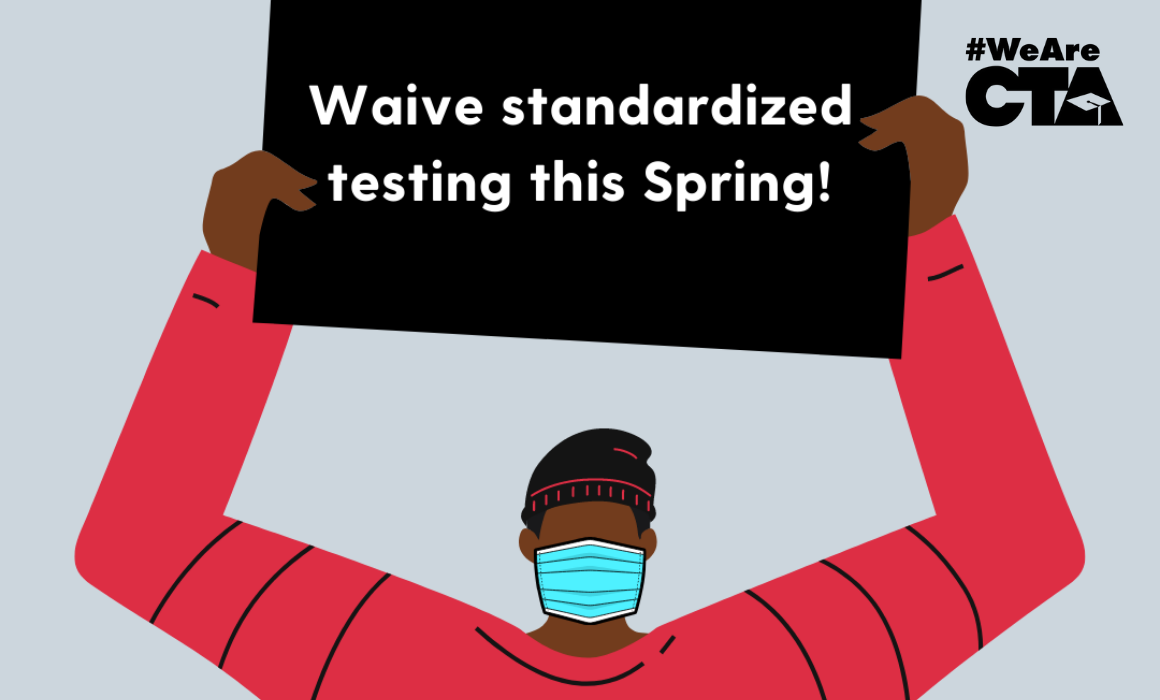
As educators continue to go above and beyond to reach, teach and protect school communities during extraordinary circumstances, CTA is calling for a waiver on standardized tests that will negatively impact students and be of little use to schools.
In comments submitted to California State Board of Education President Linda Darling-Hammond, CTA President E. Toby Boyd asked state officials to suspend the California Assessment of Student Performance and Progress (CAASPP) in spring 2021. He cited widespread inequities in student access to technology and the internet, as well as concerns about the validity of data gathered during these tests forced online due to the COVID-19 pandemic.

“CTA recommends that to truly meet California’s diverse needs, the state must pursue a waiver from standardized testing. Otherwise, we risk perpetuating the vast inequities in our state,” Boyd said, noting that educators don’t need assessments to figure out what students need. “The only purpose of statewide assessments is to compare results across the state, which does nothing to help identify individual student successes or learning gaps. State tests are about accountability and district/school-level planning, not students.”
The call to suspend standardized testing comes as the State Board of Education approved in November the development of short forms for some assessments but stopped short of requesting a waiver. The Betsy DeVos-led U.S. Department of Education has repeatedly denied such requests from states, and California officials are moving forward with assessment plans as required — though federal guidance is expected to change when the Biden administration takes office on Jan. 20. Boyd is hopeful that the new secretary of education will agree with educators.
“Conducting standardized testing in spring would be detrimental to students and of limited use to teachers, schools and school districts,” Boyd said. “The truth is that forcing students to complete and educators to administer tests that weren’t developed for a distance-learning environment serves no real useful purpose.”
Vast numbers of California students still lack internet access and the necessary equipment to reliably participate in distance learning, let alone take lengthy online tests. Continuing with business as usual on testing will exacerbate existing inequities and add even more obstacles for students who already have too many. These tests also require the use of secure internet browsers, which would need to be installed on devices for every student — a logistical feat for any school district. And there’s the simple fact that there is nothing standard about the environments in which these tests would be completed.
“On any given day, and under the best circumstances, test scores alone fail to tell us how a child is doing and where they need improvement,” Boyd said. “We need to focus our time and energy on meeting the challenges of the distance learning environment, narrowing the digital divide, and fulfilling the needs of all students — not forcing tests on our kids during a health crisis.”
CTA is supportive of the exclusion of the English Language Proficiency Assessments for California (ELPAC) from the waiver since it is used to reclassify students from “English learner” to “English proficient,” opening the door to more advanced courses. In late November, the U.S. Department of Education announced the suspension of the National Assessment of Educational Progress (NAEP) because of concerns about health and safety, and whether the data would be usable.
As educators nationwide add their names to a FairTest.org petition calling for the suspension of federal testing, you can rise with those here in California to defend students by signing CTA’s petition imploring state education officials to request a federal waiver.
“The COVID pandemic has shined a light on inequity in our communities,” Boyd says. “It’s time to stop just pointing out these disparities and to start putting energy into creating equitable opportunity for our students.”

CTA’s Stance on Assessments
CTA believes assessments should be used to inform instruction and improve student learning. They are not meant to label students or schools. State tests must be age- and subject-appropriate, and must be free from cultural, racial, gender, socioeconomic and linguistic biases. A true reflection of student achievement and improvement is always done through multiple measures and can never focus on just one test score.
Parents Can Choose to Opt Out
While state officials have yet to act on suspending testing for this spring, all parents and guardians still have the right to opt their students out of standardized assessments. California Education Code 60615 allows parents and guardians to submit written requests to school officials to excuse their students from state-mandated tests. Specific details are available from each school district. There are no consequences for opting out of testing.
What Is the CAASPP System?
California Assessment of Student Performance and Progress (CAASPP) is the state’s system of mandated and optional assessments. It currently includes three types of mandated tests: Smarter Balanced Assessments, California Alternate Assessments, and California Science Assessments. The Smarter Balanced Assessments are in English language arts and mathematics for grades 3-8 and 11. Click here for more information on CAASPP.